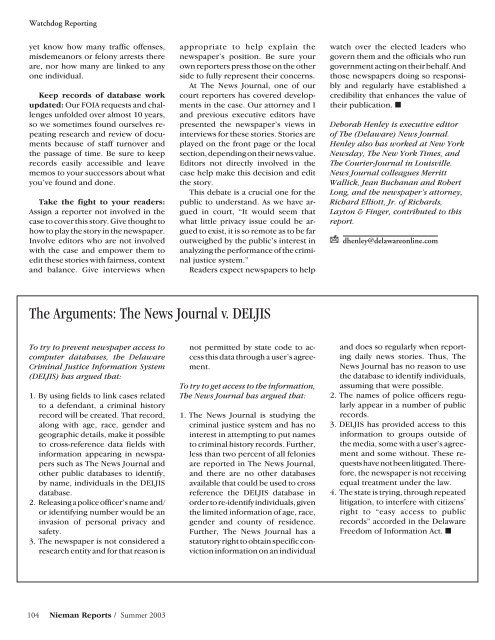summer-2003-Part 2-live - Nieman Foundation - Harvard University
summer-2003-Part 2-live - Nieman Foundation - Harvard University
summer-2003-Part 2-live - Nieman Foundation - Harvard University
- No tags were found...
Create successful ePaper yourself
Turn your PDF publications into a flip-book with our unique Google optimized e-Paper software.
Watchdog Reportingyet know how many traffic offenses,misdemeanors or felony arrests thereare, nor how many are linked to anyone individual.Keep records of database workupdated: Our FOIA requests and challengesunfolded over almost 10 years,so we sometimes found ourselves repeatingresearch and review of documentsbecause of staff turnover andthe passage of time. Be sure to keeprecords easily accessible and leavememos to your successors about whatyou’ve found and done.Take the fight to your readers:Assign a reporter not involved in thecase to cover this story. Give thought tohow to play the story in the newspaper.Involve editors who are not involvedwith the case and empower them toedit these stories with fairness, contextand balance. Give interviews whenappropriate to help explain thenewspaper’s position. Be sure yourown reporters press those on the otherside to fully represent their concerns.At The News Journal, one of ourcourt reporters has covered developmentsin the case. Our attorney and Iand previous executive editors havepresented the newspaper’s views ininterviews for these stories. Stories areplayed on the front page or the localsection, depending on their news value.Editors not directly involved in thecase help make this decision and editthe story.This debate is a crucial one for thepublic to understand. As we have arguedin court, “It would seem thatwhat little privacy issue could be arguedto exist, it is so remote as to be faroutweighed by the public’s interest inanalyzing the performance of the criminaljustice system.”Readers expect newspapers to helpwatch over the elected leaders whogovern them and the officials who rungovernment acting on their behalf. Andthose newspapers doing so responsiblyand regularly have established acredibility that enhances the value oftheir publication. ■Deborah Henley is executive editorof The (Delaware) News Journal.Henley also has worked at New YorkNewsday, The New York Times, andThe Courier-Journal in Louisville.News Journal colleagues MerrittWallick, Jean Buchanan and RobertLong, and the newspaper’s attorney,Richard Elliott, Jr. of Richards,Layton & Finger, contributed to thisreport.dhenley@delawareonline.comThe Arguments: The News Journal v. DELJISTo try to prevent newspaper access tocomputer databases, the DelawareCriminal Justice Information System(DELJIS) has argued that:1. By using fields to link cases relatedto a defendant, a criminal historyrecord will be created. That record,along with age, race, gender andgeographic details, make it possibleto cross-reference data fields withinformation appearing in newspaperssuch as The News Journal andother public databases to identify,by name, individuals in the DELJISdatabase.2. Releasing a police officer’s name and/or identifying number would be aninvasion of personal privacy andsafety.3. The newspaper is not considered aresearch entity and for that reason isnot permitted by state code to accessthis data through a user’s agreement.To try to get access to the information,The News Journal has argued that:1. The News Journal is studying thecriminal justice system and has nointerest in attempting to put namesto criminal history records. Further,less than two percent of all feloniesare reported in The News Journal,and there are no other databasesavailable that could be used to crossreference the DELJIS database inorder to re-identify individuals, giventhe limited information of age, race,gender and county of residence.Further, The News Journal has astatutory right to obtain specific convictioninformation on an individualand does so regularly when reportingdaily news stories. Thus, TheNews Journal has no reason to usethe database to identify individuals,assuming that were possible.2. The names of police officers regularlyappear in a number of publicrecords.3. DELJIS has provided access to thisinformation to groups outside ofthe media, some with a user’s agreementand some without. These requestshave not been litigated. Therefore,the newspaper is not receivingequal treatment under the law.4. The state is trying, through repeatedlitigation, to interfere with citizens’right to “easy access to publicrecords” accorded in the DelawareFreedom of Information Act. ■104 <strong>Nieman</strong> Reports / Summer <strong>2003</strong>
















